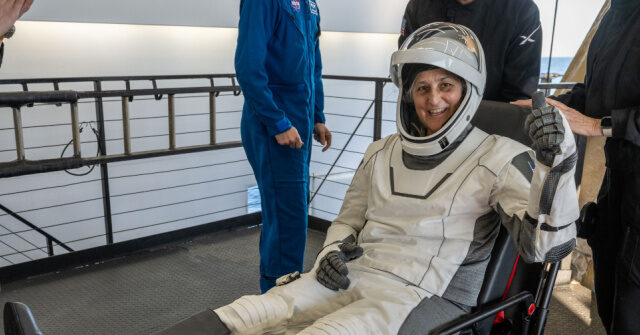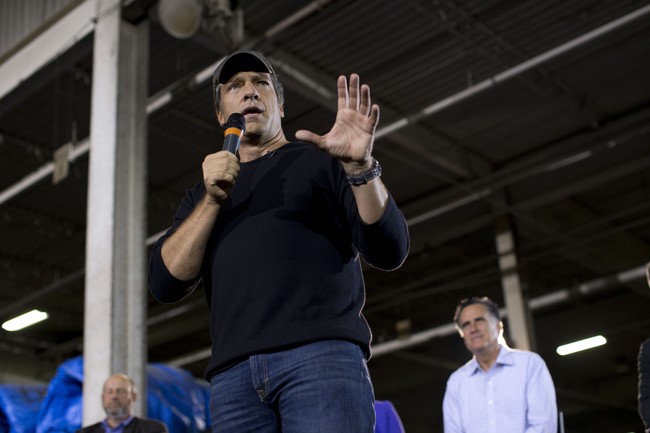The fight for control of the Senate is still extremely close.
Currently, projections favor Democrats keeping the Senate, but Republicans still have a viable path. FiveThirtyEight’s model gives Democrats a roughly seven in 10 chance to hold on to the upper chamber.
To expand their current 50-50 majority, Democrats would need to keep all of their existing seats and pick up at least one more, a challenge Republicans face if they want to retake the upper chamber as well. As of August, Democrats have just slightly surpassed Republicans in generic ballot polling.
According to the Cook Political Report, there are 10 Senate seats likely to be in play, including four that favor Democrats, three that favor Republicans, and three that are true toss-ups. Democrats have a slight advantage based on the map: Republicans are defending two GOP seats where President Joe Biden previously won, while Democrats aren’t defending any states won by former President Donald Trump.
All told, there are 21 Republican-held seats that are up this fall, and 14 Democrat-held ones. Here’s a look at the Senate races that could well decide congressional control in November.
Democrats have an edge in four states
Pennsylvania
The Democrat: John Fetterman
Pennsylvania Lieutenant Gov. John Fetterman is seen as one of the strongest Democratic candidates this cycle, though he’s had to fend off Republican critiques about his fitness following a stroke earlier this year. This past May, Fetterman easily won his Democratic primary against a crowded field of candidates. He’s also sought to strike an interesting balance: While he backs progressive policies like Medicare-for-all and a $15 minimum wage, he’s distanced himself from the progressive label. Fetterman’s campaign has responded to questions about his health by releasing cognitive tests that show his brain function is comparable to other individuals his age.
The Republican: Mehmet Oz
Reality show doctor and Trump pick Mehmet Oz just barely eked out a victory in the Republican primary. Oz has adopted conservative policy positions including support for abortion restrictions and expansive gun rights, though past statements on issues like fracking have made members of the Republican base question his bona fides. He’s also gotten flack from Fetterman’s campaign for living in New Jersey for years and for seemingly moving to Pennsylvania just ahead of his Senate run.
Why this race is interesting: This seat is a critical one for Democrats to pick up as they try to keep control of the Senate and grow their majority. It’s also one that tests whether Fetterman’s economic populist message will resonate with Trump voters. Democrats are hoping to flip this seat given Fetterman’s momentum in the state and Biden’s success there in 2020. Oz has focused on attacking Fetterman’s health in recent weeks in an attempt to suggest he may not be up for the job. Fetterman’s campaign has countered that he has had a strong recovery, and recently accepted Oz’s request to debate in October.
The state of the race: Cook rates the race as leaning Democrat; FiveThirtyEight’s polling aggregator has Fetterman up by 8.9 percentage points.
Colorado
The Democrat: Sen. Michael Bennet
Two-term Sen. Michael Bennet is defending his seat. Bennet has focused heavily on expanding the child tax credit during his time in the Senate, and touted the funding he’s brought back to the state for infrastructure improvements.
The Republican: Joe O’Dea
Joe O’Dea, a more moderate Republican who is the CEO of a construction company, is attempting to appeal to voters in the center by taking more measured positions like opposing the Supreme Court’s decision on Roe v. Wade.
Why this race is interesting: O’Dea is more moderate compared to several other Republican Senate candidates — and his success in casting himself as someone who’d be a middle-of-the-road senator could make this race more competitive. As Vox’s Nicole Narea explained, however, O’Dea still holds many typical Republican stances. He’s said he would have voted to confirm the conservative Supreme Court justices who’ve played a central role in restricting abortion access, previously voted for Trump, and supports the construction of a border wall.
The state has historically leaned Democratic. In 2016, Bennet won with 50 percent of the vote to the 44 percent that Republican Darryl Glenn received. It’s worth noting, however, that Bennet did not secure a majority of the vote in either of his Senate elections — an indication that those victories were less decisive, and that even a slight change in the dynamics of the race could boost O’Dea, whose candidacy could give Republicans a roadmap for winning back bluer states.
The state of the race: Cook rates the race as leaning Democrat, while the FiveThirtyEight polling aggregator has Bennet up by 9.1 percentage points.
New Hampshire
The Democrat: Sen. Maggie Hassan
Incumbent Sen. Maggie Hassan has made the defense of abortion rights a centerpiece of her campaign, while her opponent has praised the Supreme Court decision to overturn Roe. Hassan is vying for her second term in the upper chamber after previously serving as New Hampshire governor.
The Republican: Don Bolduc
Retired Brigadier General Don Bolduc, a far-right candidate, previously leaned into claims that Trump won the 2020 election and told Hassan to “get over it” regarding the rollback of Roe. He has tried to backtrack on his election denialism, more recently noting that Biden’s win was “legitimate.” He’s also said that he wouldn’t support a bill from Sen. Lindsey Graham (R-SC) that bans abortion after 15 weeks, noting that the decision should be left up to the states.
Why this race is interesting: The race will be an indicator of to what degree far-right candidates are able to gain traction in a general election in a swing state. Because Bolduc is more extreme than other possible options, Democrats view him as an easier opponent to beat in a state that’s gone blue in recent presidential elections. New Hampshire remains a battleground, however, given the tight margins that Hassan won by in 2016 and the national trends that could favor Republicans this year.
The state of the race: Cook rates the race as leaning Democrat. The FiveThirtyEight polling aggregator has Hassan up by 7.3 percentage points.
Arizona
The Democrat: Sen. Mark Kelly
Sen. Mark Kelly, a former astronaut, is vying for a full term after winning a special election for his seat in 2020. Kelly has emphasized his independence on issues like immigration and leaned into his willingness to buck his own party when necessary. He’s also known for being a gun control advocate alongside his wife, former Rep. Gabby Giffords, who was previously shot in the head during a constituent event.
The Republican: Blake Masters
Venture capitalist Blake Masters, who has the backing of tech billionaire Peter Thiel, is among the election deniers running this year. Masters has also supported the 15 week abortion ban that Sen. Lindsey Graham introduced, but attempted to soften his hardline stance on the issue as it’s become clear the politics have been less favorable to Republicans. He’s been criticized for making controversial statements in the past including blaming Black people for gun violence as well.
Why this race is interesting: This race is another that could reveal if a far-right GOP candidate can succeed in a battleground state. Kelly has been able to establish a strong base of support by reaching independents and moderate Republicans. Masters is still trying to recapture the seat by tying Kelly to the president and his low approval ratings, however; it’s a strategy Republicans are trying elsewhere, but that may have more salience in a state Biden won by roughly 0.3 percentage points.
The state of the race: Cook rates the race as leaning Democrat, while the FiveThirtyEight polling aggregator has Kelly up by 7.5 percentage points.
Three states are true toss-ups
Georgia
The Democrat: Sen. Raphael Warnock
Sen. Raphael Warnock won a closely contested runoff in January 2021 and is now running for a full term. Warnock, a pastor at Atlanta’s Ebenezer Baptist Church, where Martin Luther King Jr. was once a pastor, has emphasized his work on reducing insulin costs and support for Medicaid expansion.
The Republican: Herschel Walker
Herschel Walker, a former football star, has become known for a number of gaffes, allegations of domestic violence, and a hardline position on abortion. Walker’s celebrity status and support from Trump have given him a boost among some voters, however.
Why this race is interesting: Georgia is one of the tightest races this cycle, and could well go to another runoff if no candidate wins more than 50 percent of the vote this fall. It’s also among the states where Republican candidate quality could play a major role. The state’s GOP governor is trending up in his reelection battle, and Republicans are thought to have a slight advantage in the state overall, but Walker could be weighed down by the controversial statements he has made. Warnock is considered the stronger candidate of the two due to his incumbency and favorability, though other headwinds that Democrats are facing, including inflation, could still help Republicans.
The state of the race: Cook rates the race as a toss-up, and FiveThirtyEight’s polling aggregator has Warnock up by 2 percentage points.
Nevada
The Democrat: Sen. Catherine Cortez Masto
Sen. Catherine Cortez Masto is running for reelection and making her support for abortion access a key focal point. Prior to winning a Senate seat in 2016, Cortez Masto served as the state’s attorney general.
The Republican: Adam Laxalt
Adam Laxalt, also a former Nevada attorney general, has centered the economy and law-and-order rhetoric as he tries to flip the state. He’s also an election denialist and has tried to curb abortion rights in the past as AG. Laxalt is the grandson of Paul Laxalt, a former governor and senator in the state.
Why this race is interesting: Republicans are eyeing Nevada as a potential pick-up because of how competitive the polls have been up to this point. The race is a face-off between the first Latina senator ever elected who’s emphasized her defense of abortion rights, and a hardline election denier and law-and-order candidate. Republicans hope to continue building on gains with Latino voters in the state by highlighting changes they’d make to economic policy. Specifically, Laxalt’s emphasis on inflation is aimed at winning over working-class voters in the state, where the tourism industry was decimated by the pandemic.
The state of the race: Cook rates the race as a toss-up; FiveThirtyEight’s polling aggregator has Cortez Masto up by 0.7 percentage points.
Wisconsin
The Democrat: Lieutenant Gov. Mandela Barnes
Wisconsin Lieutenant Gov. Mandela Barnes is a former community organizer who has stressed his support for investments in the region’s manufacturing industry. He previously served in the Wisconsin state assembly and backed progressive ideas like Medicare-for-all, though he’s since moderated his messaging for the general election.
The Republican: Sen. Ron Johnson
Incumbent Sen. Ron Johnson is defending his seat in a state that Biden won in 2020 by less than 1 percentage point. Johnson is a longtime fiscal conservative and Trump ally who recently faced scrutiny for his unwillingness to express support for a same-sex marriage protections bill. (He has said he won’t oppose the bill, but declined to say he’ll back it.)
Why this race is interesting: Given Biden’s success in the state, Johnson is viewed among the most endangered Republicans this cycle. The contest gives voters a stark choice between a young, progressive Democrat, and a prominent conservative Republican incumbent. As part of his campaign, Johnson has sought to cast Barnes as extreme, though Johnson’s previous support for Trump’s attempt to overturn the election and opposition to the Covid-19 vaccine are positions that could hurt him with swing voters.
Barnes has seen strong momentum in polls, but Johnson has also managed to pull out a win in the purple state twice before. Were Barnes to win, he’d likely bolster Democratic support for changing filibuster rules and would take out a Republican who’s frequently blocked spending on social programs.
The state of the race: Cook rates the race as a toss-up. The FiveThirtyEight polling aggregator has Johnson up by 0.1 percentage points.
Republicans have the advantage in Florida, North Carolina, and Ohio
Florida
The Democrat: Rep. Val Demings
Congresswoman and former Orlando police chief Val Demings is attempting to retake this Senate seat in a state that’s grown increasingly red in recent years. She drew national attention as a manager in Trump’s first impeachment trial and was among the candidates Biden reportedly considered for the vice presidency.
The Republican: Sen. Marco Rubio
Sen. Marco Rubio is vying for a third term in the Senate and emphasizing his efficacy on issues including health care for veterans and aid to small businesses. Rubio is also a top Republican on the Intelligence Committee, and is known for his run for the presidency in 2016.
Why this race is interesting: As a moderate with a longtime background in law enforcement, Demings is viewed as a strong Democratic candidate who’s been able to rebuff some of the Republican attacks on crime. If successful, she could offer Democrats a model for winning in redder battlegrounds. Still, the state skews more Republican and Rubio has had solid support in the past, including from many of Florida’s Latino and Hispanic voters. The contest remains an uphill battle for Demings, but strong fundraising numbers and voter energy on abortion could help her close the gap.
The state of the race: Cook rates the race as lean Republican, and the FiveThirtyEight polling aggregator has Rubio up by 3.8 percentage points.
North Carolina
The Democrat: Cheri Beasley
Former chief justice of the North Carolina Supreme Court Cheri Beasley is a moderate who has focused on reaching swing voters. She’s spoken in defense of abortion rights, while emphasizing her independence from her party.
The Republican: Rep. Ted Budd
Rep. Ted Budd, a self-described “conservative warrior,” has run a more under-the-radar campaign and put the emphasis on issues like inflation. A gun store owner, Budd was among the Republicans who challenged the certification of 2020 election results.
Why this race is interesting: This seat has been vacated by retiring Sen. Richard Burr, meaning there is no incumbency advantage for Republicans. It’s a race that will depend heavily on whether a middle-of-the-road Democrat is able to reach independents in a state that’s skewed toward the GOP. North Carolina has also grown more diverse in the last two decades, a trend that Democrats could capitalize on if they engage in effective voter outreach.
The state of the race: Cook rates the race as lean Republican. The FiveThirtyEight polling aggregator has Budd up by 0.3 percentage points.
Ohio
The Democrat: Rep. Tim Ryan
Congressman and former presidential candidate Tim Ryan is a moderate who has made his campaign about bringing manufacturing jobs back to the state. He’s stressed that he’ll work across the aisle and advance tax cuts for the middle class.
The Republican: J.D. Vance
J.D. Vance, a venture capitalist and author of the bestselling memoir Hillbilly Elegy, tacked hard to the right in order to win the Republican nomination. He’s also made controversial statements about abortion and whether parents should stay in violent marriages for the sake of their children, comments he later said were misconstrued.
Why this race is interesting: The race is a microcosm of Democratic efforts to win back white working-class voters they lost to Trump — and a test of how valuable close alignment with the former president can continue to be for GOP candidates. Vance’s controversial statements and policy positions have potentially made this race more competitive than it otherwise would be in this Republican-leaning state. Ryan has also carved out a fundraising advantage, and the race remains extremely tight.
The state of the race: Cook rates the race as lean Republican, while the FiveThirtyEight polling aggregator has Ryan up by 0.2 percentage points.





















Discussion about this post